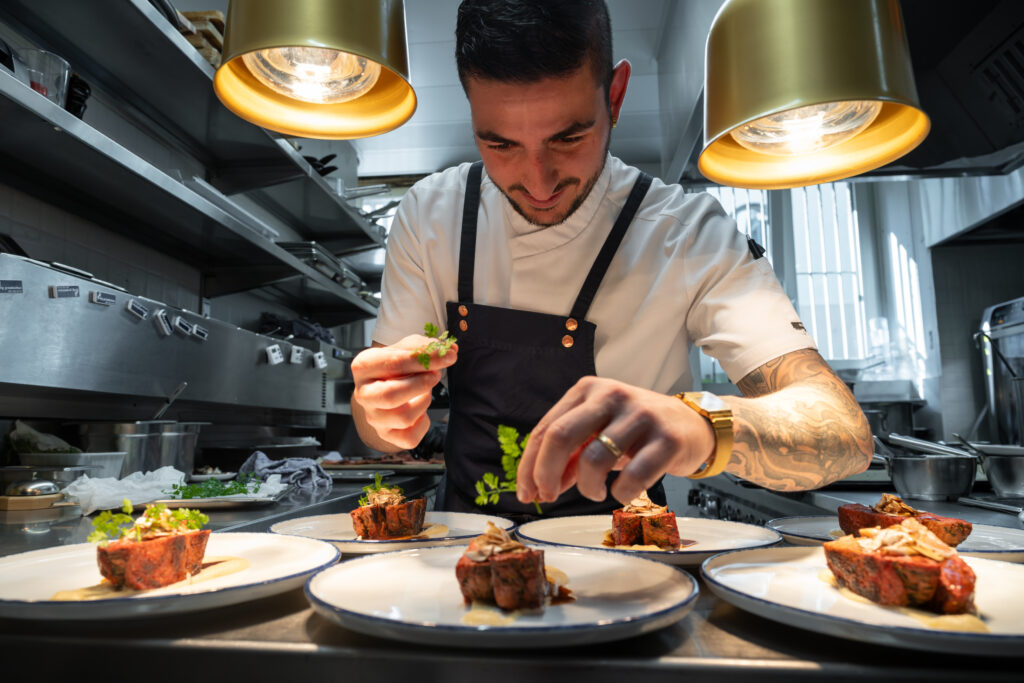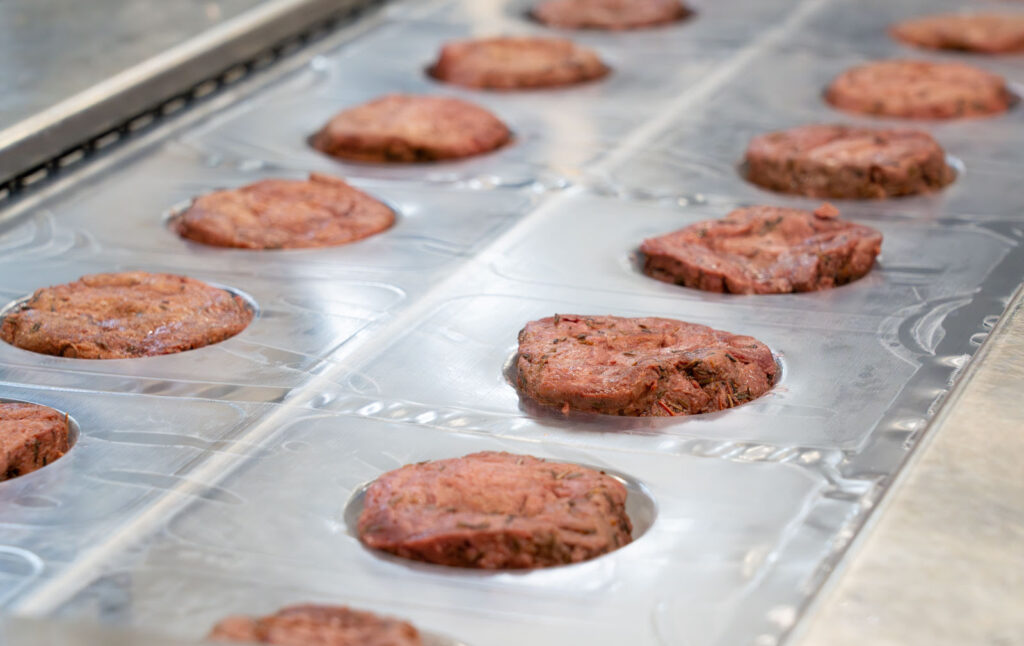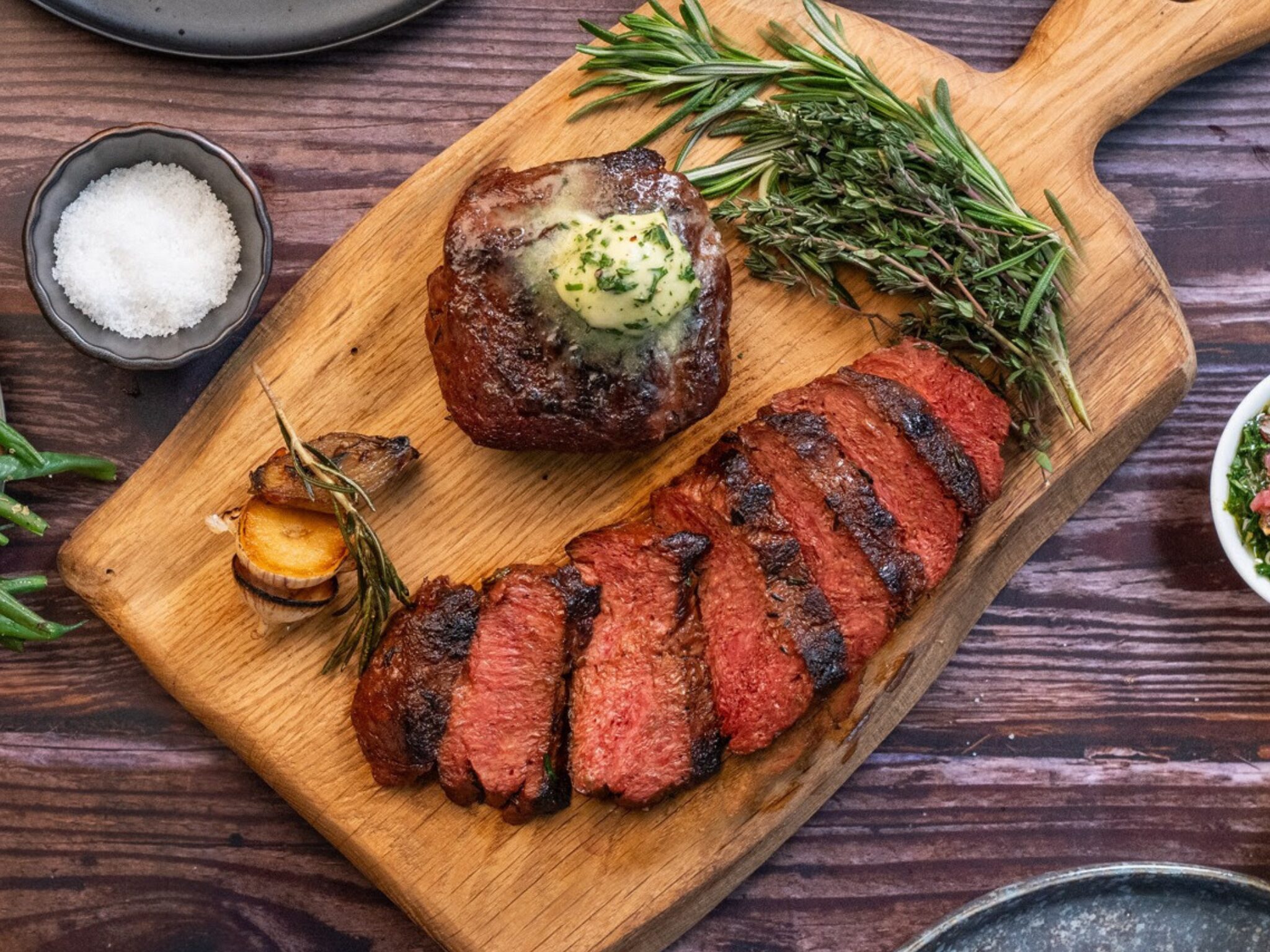5 Mins Read
A leader in the European plant-based meat sector, Switzerland’s Planted has launched a clean-label whole-cut steak leveraging a proprietary fermentation process, hitting flavour, health and climate touchpoints all at the same time.
Swiss vegan startup Planted has launched what it describes as a first-of-its-kind fermented steak alternative, after making a multimillion-dollar investment in a new fermentation facility in Kemptthal, Switzerland, which has created 30 technical and operational jobs.
The clean-label steak is the first product born out of the company’s whole-muscle platform, which facilitates the growth of muscle-like fibres through proprietary fermentation processes, and was the result of a CHF 2 million ($2.3M) injection by state-backed innovation agency Innosuisse, as part of the Swiss Accelerator Program.
A year on, Planted is rolling out its vegan steak in European foodservice, including in restaurants in Switzerland, Germany and Austria. The brand has plans to launch the product in retail as well as D2C channels later this year.
“In the research and development process, we have worked with over 50 gastronomy professionals to achieve a steak that is literally unreal, in taste, texture, application and overall eating experience,” said Planted co-founder Lukas Böni. “We are very proud that so many restaurants have added it to their menus already.”
Delivering on taste and health

The fermentation-derived steak is an extension of Planted’s range of clean-label meat alternatives, made from soy protein, rapeseed oil, bean and rice flours, and a blend of microbial cultures. However, it does mark a departure from the high-moisture extrusion process it employs to make its chicken, pork and duck analogues, instead leveraging a patent-pending solid-state fermentation process that lasts 30-40 hours.
“It’s a true game changer – not only for us, but also for the whole category,” said Böni. “No other plant-based steak on the market uses only natural ingredients, zero additives and displays features such as juiciness as well as tenderness.” Planted’s steak has 17g of protein (versus 25g for conventional steak), 182 calories (vs 271 calories), 0.9g saturated fat (vs 8g) and 5.8g dietary fibre (vs 0g), while containing 25% of the daily recommended value for iron, and 72% for vitamin B12.
This will appeal to consumers who are growing increasingly concerned about the health credentials and ultra-processing of plant-based meat products. A large pan-European survey last year found that health was the primary reason more than half of consumers were eating less meat, and the second biggest factor influencing their plant-based meat purchasing decisions, with 46% citing this consideration.
Meanwhile, meat alternatives are being linked to ill health as a result of their status as ultra-processed foods, which is also why 54% of Europeans avoid them, a separate poll has shown. It’s why brands are increasingly focusing on shorter ingredient lists and whole-food compositions in this sector.
But the health skew hasn’t taken away the limelight from taste – the most influential factor for purchasing plant-based meat – either. The fermentation process enables Planted to produce a meaty steak with “juicy tenderness”.
“Fulfilling very demanding culinary requirements, the Planted steak allows us chefs to focus on what we are best at: creating and sharing emotions,” noted Peter Schärer, executive head chef at Zürich restaurant Kronenhalle. “The Planted steak reacts beautifully to different cooking styles, already delighting and surprising our guests.”
This comment reflects why the brand is taking the foodservice-first approach, which enables it to fine-tune the product based on feedback from professional chefs before entering the retail market. “We’ve always worked this way,” Planted co-founder and CEO Pascal Bieri told AgFunderNews. “When we started, we were selling our chicken in foodservice channels and we were approached by [leading Swiss retailer] Coop. Shortly after that, Covid hit and basically all of our restaurant customers were temporarily out of business, but we were able to scale through Coop.”
Having secured $131M in total funding, the brand’s products are now in more than 8,000 foodservice and 8,700 retail locations across Europe, and it has emerged as the market leader in its home country, ranked number two in Austria, and is in the top five in Italy, and top 10 in Germany.
Planted to expand fermentation tech to other product categories

Planted ascribes these advances in flavour and nutrition to its fermentation technology. The company has laid out its aim to create multiple different product categories using its whole-muscle platform, and describes the steak as comparable to a full tenderloin.
Currently, it can produce 15 tons of steak per day, but is now scaling up its capabilities through the Kemptthal facility. “This investment in our expansion stems from a strategic decision to enhance our biotechnology footprint in Kemptthal – from labs to production,” said Böni. “We are proud to be one of the few innovators of plant-based meat that takes on all steps in the production process, from R&D to industrial production. The additional and new production site allows Planted a very fast turnaround from pilot stage to industrial production, significantly closing the time gap to market launch.”
He added: “Our aim is to introduce innovative products from our fermentation platform to the market fast, particularly our Planted steak, which utilises the most advanced and disruptive fermentation technology today in terms of scalability, taste and product quality.
Whole cuts have long been touted as the “holy grail” of plant-based meat, with a host of companies working on such meat alternatives around the world. This includes mycelium chicken and beef maker Meati, fermented steak company Chunk Foods (both US), alt-salmon startups Esencia Foods (Germany), Revo Foods (Austria) and New School Foods (Canada), mycelium chicken breast maker Libre Foods (Spain), and plant-based beef filet producer Juicy Marbles (Slovenia).
But even with the importance laid upon taste, texture and nutrition, Planted isn’t sidelining the sustainability aspect either. Its internal calculations show that the whole-cut steak analogue emits 97% fewer greenhouse gas emissions than a conventional steak product, while consuming 81% less freshwater as well.
Additionally, the new production site is shared by various food tech companies, and leverages ambient air as an energy source, which feeds the heat pumps to provide heating and cooling capabilities. This is estimated to save over 44,000 tonnes of CO2 over a 30-year period.
The fermentation-derived alternative protein sector outfinanced both plant-based and cultivated meat in the first half of 2023, and has breached the $4B threshold in all-time funding. With technologies like Planted’s, which can address multiple consumer pain points at the same time, the industry is poised to continue its rapid growth.



